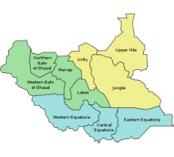
Lanyi, SOUTH SUDAN—When the gunshots started in Lanyi town last December, Wilma Avowa was grinding corn in preparation for dinner. She grabbed a few clothes and some food, and packed them in her bag. As she fled her home in this rural community five hours from South Sudan’s capital of Juba, she feared for her two pregnant neighbors, both of whom were due to deliver soon.
The two women, Esther Maliga, 19, and Florence Lextion, 24, were at home resting.
Lextion was lying on a mat on the floor when she heard the gunfire, her husband far away from the village tending to the family’s cattle. She got up quickly and packed a few clothes for the baby she knew was coming. Her plan to give birth in the local health facility was seemingly quashed by the civil unrest embroiling her nascent country, which became independent less than three years before.
She took the hands of her two children, 3 and 5 years old, and set off for the protection of the hillside about 2 kilometers away. Lextion moved as fast as she could, but had to stop several times to rest, hiding behind trees and lying flat on the ground with the children next to her.
By the time Lextion and her children reached the hillside, most of their neighbors were gathered there, including Avowa and Maliga. The women crowded under a rock overhang, which hid them from sight. They stayed there through the night and most of the next day. Lextion and Maliga both went into labor that afternoon.
Luckily for both women, Avowa was prepared. A volunteer home health promoter for the past 18 months, Avowa, 58, had stored in her bag three doses of misoprostol—a drug that helps prevent postpartum hemorrhage—along with an educational flip chart and two “Mama Kits,” the basic essentials needed to assist in a birth, including a sterile blade, a small plastic sheet, soap, gloves and ligatures.
The full article continues at http://www.usaid.gov/news-information/frontlines/maternal-child-health/mothers-give-birth-safely-amid-south-sudans-conflict on USAID’s website.

